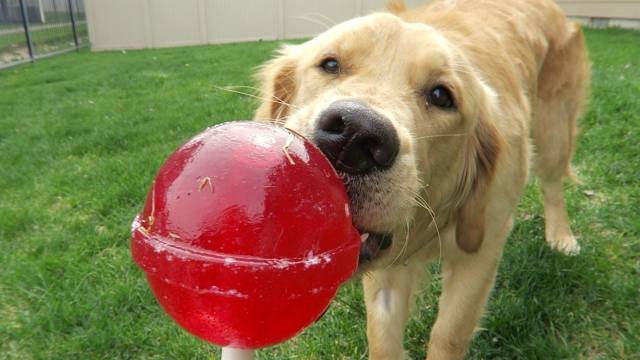Connect with a verified veterinarian in minutes. Licensed vets are available 24/7 to answer your questions. No need to worry about your furry family member.
Lollipops are enjoyed by young and old alike! What’s better than having a lollipop as you relax and watch TV or read? Some people do use lollipops as a way to relax. Lollipops are great treats—but are they good for dogs?
What are Lollipops?
Lollipops, also called suckers, are a sugary, flavored candy that is hard and is mounted on a stick. You’re supposed to suck and lick the lollipop until it’s gone. Or if you’re like some of us, we prefer to chew them when they melt down to a certain level. However you eat your lollipop, these are a very popular candy that’s been around for a long time.
Some believe lollipops were first created back in medieval times. Back in those days, the rich would eat boiled sugar using a stick. It’s entirely possible, though, that lollipops go back further in history. No one knows for sure.
These days, lollipops come in many different types and in many flavors. Most lollipops are made with sugar; however, some lollipops are also made with artificial sweeteners.
Common Ingredients in Lollipops
Lollipops are traditionally made with the following ingredients:
- Sugar
- Corn syrup
- Citric acid
- Malic acid
- Salt
- Artificial flavor
- Color (Red 40, Yellow 6, Yellow 5, Blue 1)
These ingredients are not usually lethal; however, they can impact your dog’s system. For instance, some dogs are sensitive to artificial colors and flavors.

Review symptoms, medications & behavior to keep your pets healthy with a Vet Online in just minutes.
Ask a Vet Live NowAre Lollipops Bad for Dogs?
The answer is it depends. If your dog has just one lick of a lollipop, chances are he will be just fine. Some dogs may experience some vomiting and diarrhea, but it usually lasts less than 24 hours.
However, having said that, if a dog eats a whole lollipop, then he could become sick. Sugar can be toxic for dogs. Too much sugar can make a dog sick, causing an upset stomach and vomiting, metabolic changes, and more. If a dog eats too much sugar, he could also develop pancreatitis.
What about lollipop wrappers? It is possible for a dog to eat the entire lollipop, wrapper, and all! One wrapper may not cause a problem; however, if your fur baby has eaten several wrappers, he could develop an intestinal blockage. If your dog has eaten several lollipops and their wrappers, it’s best to call the vet right away.
Another problem are sugar-free lollipops, which may be sweetened with xylitol. Xylitol is an artificial sweetener that is highly toxic to dogs.
One more problem with lollipops is if the dog eats the stick. The stick can become lodged in the throat and pose a choking hazard, or it can get stuck in the digestive tract and cause an intestinal blockage.
If your dog has eaten a sugar free lollipop or a whole lollipop including the stick, contact your vet straight away as your dog will likely need treatment.
Xylitol Poisoning in Dogs
Xylitol is very bad for dogs because rather than slowly stimulating the release of insulin from the pancreas, it causes a rapid release, which brings a huge drop in the dog’s blood sugar (called hypoglycemia). This can happen within 10 to 60 minutes after ingesting xylitol. This can be a life-threatening condition.
If your dog has eaten a lollipop sweetened with xylitol and/or has eaten the stick, then call the vet immediately. This is a medical emergency. If your dog is treated early, then he has a very good chance of a full recovery.
How to Keep Your Dog Safe from Lollipops (And Other Candies)
We’re pretty sure your fur baby loves to eat anything you’re eating. It’s in his nature! But keeping your dog safe from lollipops and other candies is essential. Here are some tips to ensure your fur baby stays safe!
Keep all sweets out of your dog’s reach: this is the most important tip we can give you. Your dog could find your Christmas stash of sweets and devour them within a few moments! So, make sure all sweets are out of your dog’s reach. Be sure to store them in containers kept on a shelf or in a cabinet your fur baby can’t access.
Watch the trash can: another common place where dogs may access sweets (including lollipops) is in the trash can. If your canine companion loves to eat out of the waste basket, consider investing in a dog-proof version he can’t open.
Everyone needs to know the rules: everyone in your home (including the kids and visitors) needs to know that your dog can’t eat sweets or candies. Explain why these are bad for your fur baby and safer options that he can eat (such as certain fruits, dog-friendly treats, etc.).
Connect with a verified veterinarian in minutes. Licensed vets are available 24/7 to answer your questions. No need to worry about your furry family member.

Aisling O'Keeffe, MVB CertSAM ISFMCertAdvFB
This article has been reviewed and approved by an independent Veterinarian: Aisling qualified as a vet 7 years ago from University College Dublin. She has worked in a mixture of UK small animal hospitals along with Irish practices. She worked for 3 years in a feline-only hospital where she further developed her feline medicine and surgery skills. She currently lives and works in a small animal hospital in Cork, Ireland.
Review symptoms, medications & behavior to keep your pets healthy with a Vet Online in just minutes.
Ask a Vet Live Now






